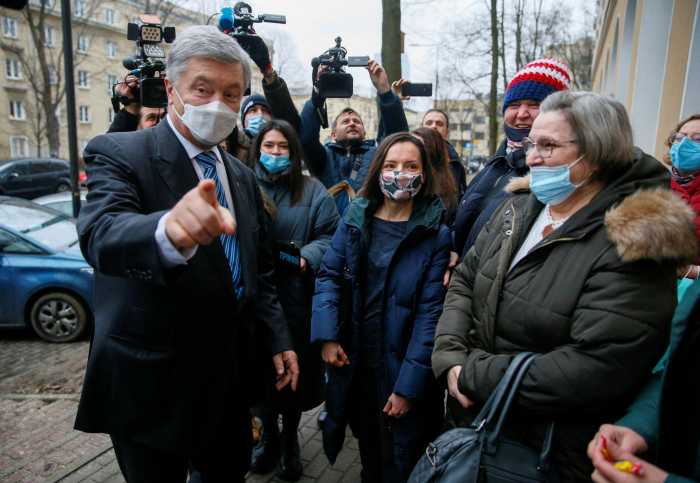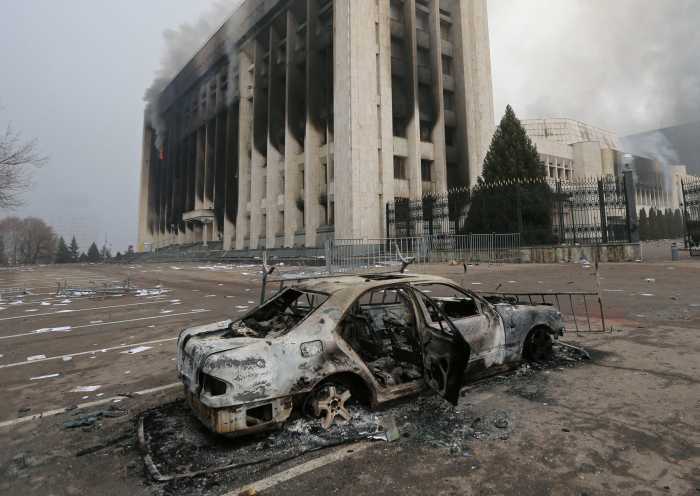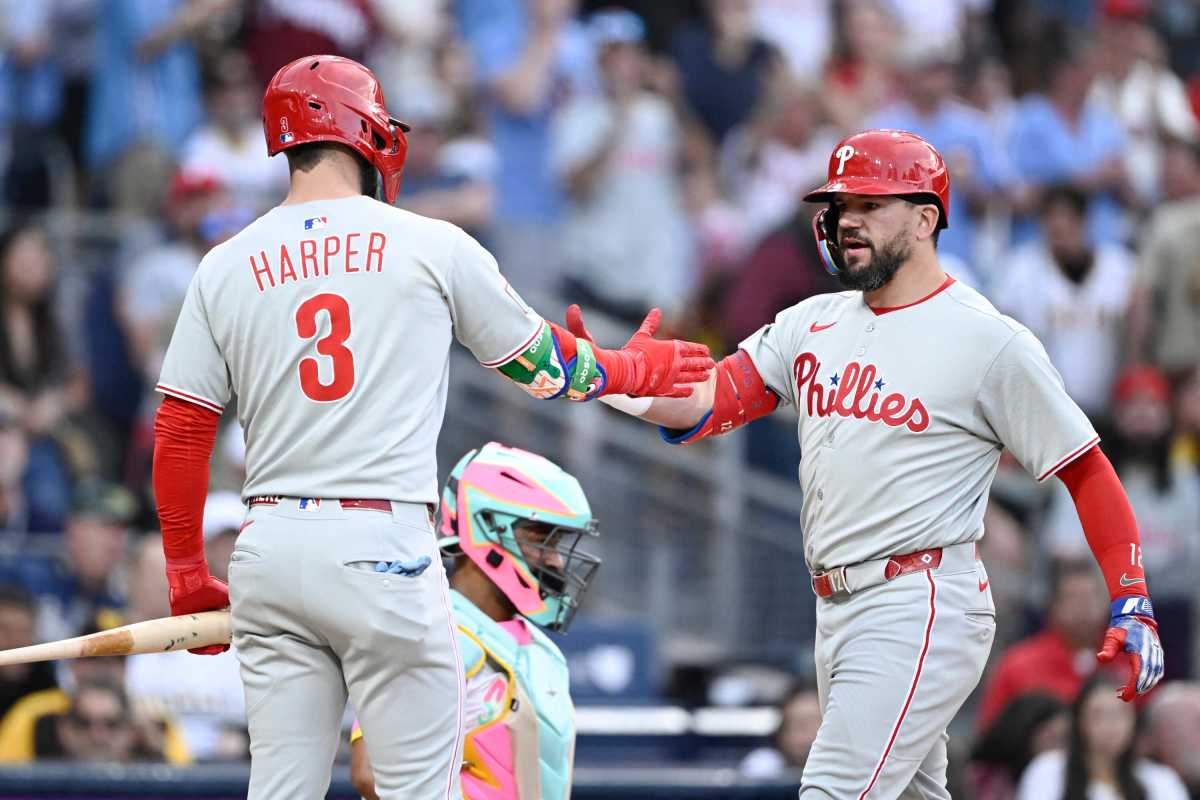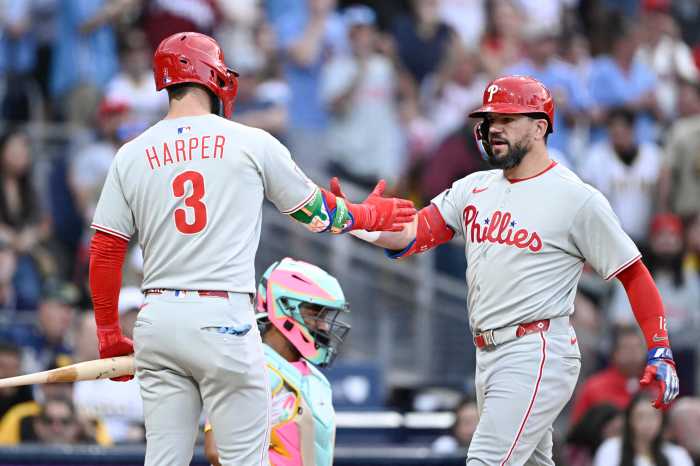By Maria Tsvetkova
KYIV/MOSCOW – President Vladimir Putin put Russia’s nuclear deterrent on high alert on Sunday in the face of a barrage of Western reprisals for his war on Ukraine, which said it had repelled Russian ground forces attacking its biggest cities.
The United States said Putin was escalating the war with “dangerous rhetoric,” amid signs that the biggest assault on a European state since World War II was not producing rapid victories, but instead generating a far-reaching and concerted Western response.
The Ukrainian president’s office said negotiations with Moscow without preconditions would be held at the Belarusian-Ukrainian border. But it was not clear when they would start.
“I do not really believe in the outcome of this meeting, but let them try, so that later not a single citizen of Ukraine has any doubt that I, as president, tried to stop the war,” President Volodymyr Zelenskiy said.
Less than four days after it started, the invasion has triggered a Western political, strategic, economic and corporate response unprecedented in its extent and coordination.
The 27-nation European Union decided for the first time in its history to supply weapons to a country at war, and a source told Reuters it would send $507 million worth of weaponry to its eastern neighbor.
As missiles fell on Ukrainian cities, nearly 400,000 civilians, mainly women and children, have fled into neighboring countries. Hundreds were stranded in Kyiv on Sunday waiting for trains to take them west, away from the fighting.
The capital remained in Ukrainian government hands, with Zelenskiy rallying his people daily despite Russian shelling of civilian infrastructure.
The World Health Organization said medical oxygen was running low. But a doctor said a blood bank where donors had come under fire on Saturday was again packed.
The EU shut all Russian planes out of its airspace, as did Canada, and banned the Russian media outlets RT and Sputnik. With flight options dwindling, the United States and France urged their citizens to consider leaving Russia immediately.
Germany, which had already frozen a planned undersea gas pipeline from Russia, said it would increase defense spending massively, casting off decades of reluctance to match its economic power with military clout.
The British oil major BP announced it would give up its 19.75% stake in Russian oil giant Rosneft, writing off up to $25 billion.
World Bank President David Malpass said the Group of Seven economies would discuss Ukraine on Tuesday, and that the bank may be able to provide Ukraine with financial aid in days.
But Putin, who has called the invasion a “special operation,” thrust an alarming new element into play when he ordered Russia’s “deterrence forces” — which wield nuclear weapons — onto high alert.
He has justified the invasion by saying “neo-Nazis” rule Ukraine and threaten Russia’s security — a charge Kyiv and Western governments say is baseless propaganda.
On Sunday, he cited aggressive statements by NATO leaders and the raft of economic sanctions imposed on Russia by the West.
“Not only do Western countries take unfriendly measures against our country in the economic dimension — I mean the illegal sanctions that everyone knows about very well — but also the top officials of leading NATO countries allow themselves to make aggressive statements with regards to our country,” he said on state television.
Putin previously referred to his nuclear arsenal in a speech announcing the start of the invasion on Thursday, saying Russia’s response to any country that stood in its way would be immediate and carry “consequences that you have never encountered in your history.”
The EU foreign policy chief said Russia had clearly threatened a nuclear attack on countries supporting Ukraine after the invasion.
“Just to mention the possibility of using nuclear weapons — it’s such a gigantic irresponsibility that says a lot about the personality of (the person) who is doing that,” Josep Borrell told a news conference in Brussels after a virtual meeting of EU foreign ministers.
“We are afraid that Russia is not going to stop in Ukraine.”
U.S. Ambassador to the United Nations Linda Thomas-Greenfield told the U.N. Security Council: “This is another escalatory and unnecessary step that threatens us all. We urge Russia to tone down this dangerous rhetoric regarding nuclear weapons.”
A U.S. defense official said Washington was trying to assess what Putin’s announcement meant, but that it increased the danger from any miscalculation.
In the strongest economic sanctions yet, the United States and Europe said on Saturday they would banish big Russian banks from the main global payments system SWIFT and announced other measures to limit Moscow’s use of a $630 billion war chest.
The president of neutral Switzerland said he expected his government to follow the EU on Monday in sanctioning Russia and freezing Russian assets.
In New York, the U.N. Security Council convened a rare emergency meeting of the U.N. General Assembly, or all the United Nations’ 193 member states, for Monday.
Rolling protests have been held around the world against the invasion, including in Russia, which has clamped down hard, detaining an additional 2,000 protesters on Sunday in 48 cities, bringing total arrests there to more than 4,000.
Tens of thousands of people across Europe marched in protest against Russia’s invasion, including more than 100,000 in Berlin.
A Ukrainian state news agency said that Russian troops had blown up a natural gas pipeline in Kharkiv, Ukraine’s second largest city, sending a burning cloud into the sky.
Soon after, Russian armor rolled into Kharkiv, in northwest Ukraine, and witnesses reported firing and explosions. But city authorities said the attack had been repelled.
Reuters was unable to corroborate the information.
Ukrainian forces also appeared to be holding off Russian troops advancing on Kyiv.
However, satellite imagery released by the private Maxar Technologies taken on Sunday showed a 3.25 mile long convoy of Russian ground forces including tanks approximately 40 miles away heading towards Kyiv. Reuters could not independently verify the images.
“We have withstood and are successfully repelling enemy attacks. The fighting goes on,” Zelenskiy said in the latest of several video messages from the streets of Kyiv.
He has declined to leave the city and has been marshaling combatants and civilians, many of whom have sought shelter in underground railway stations.































